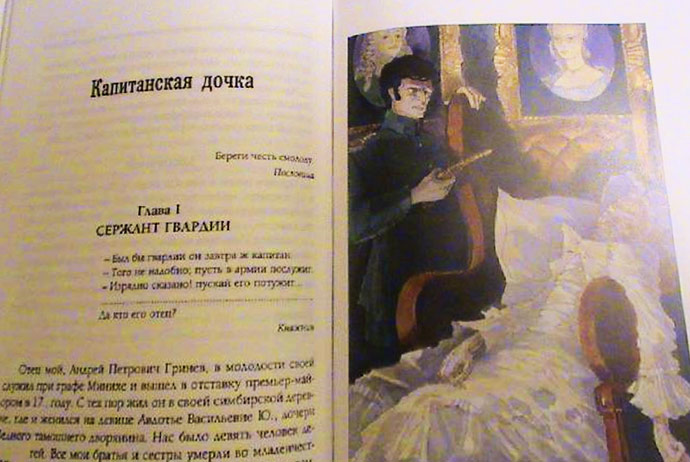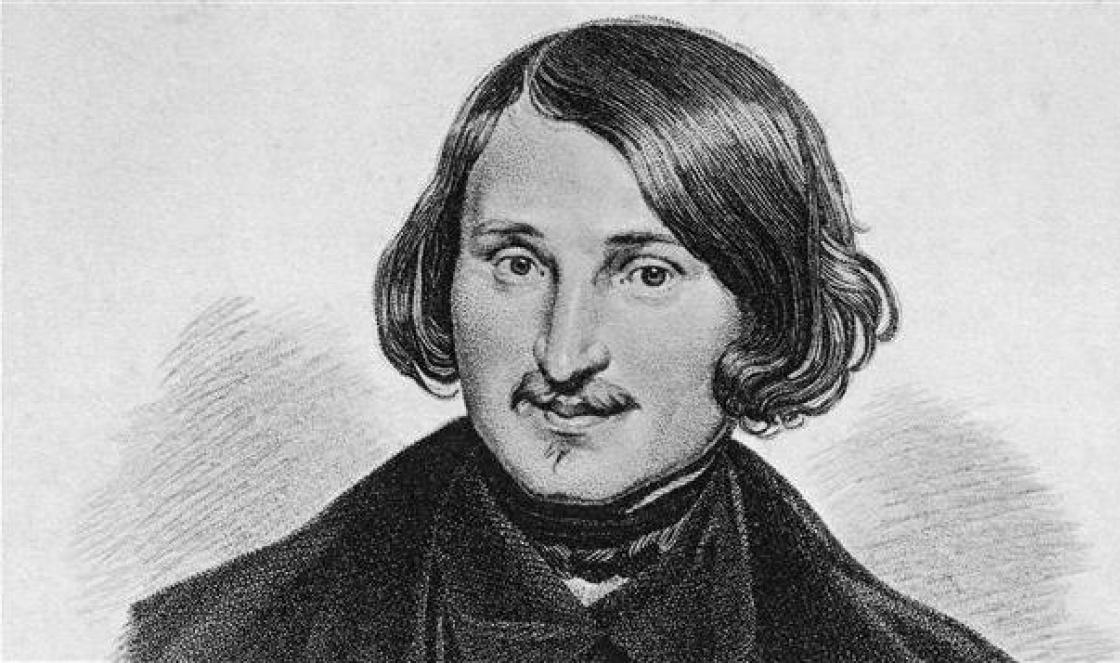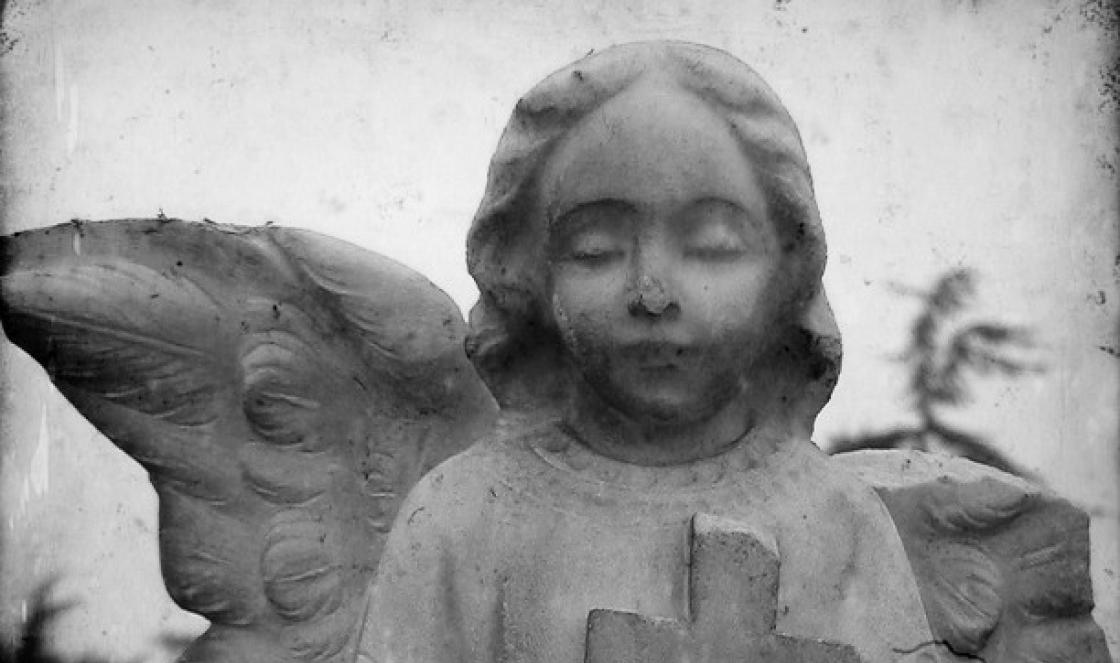Russian poet, playwright and prose writer, who laid the foundations of the Russian realistic trend, critic and literary theorist, historian, publicist; one of the most authoritative literary figures of the first third of the 19th century.
Pushkin, in his work, which is an artistic encyclopedia of Russian reality, not only supported some of the ideas of the Decembrists, but also touched upon the fundamental social problems of his time: the autocracy and the people, the individual and the state, the tragic loneliness of the advanced noble intelligentsia of the Golden Age.
Even during the life of Pushkin, his reputation as the greatest national Russian poet developed. Pushkin is regarded as the founder of the modern Russian literary language.

"Captain's daughter"
A historical novel (or story) by A. S. Pushkin, which takes place during the uprising of Emelyan Pugachev. First published without indicating the name of the author in the 4th book of the Sovremennik magazine, which went on sale in the last decade of 1836.
The Captain's Daughter belongs to the range of works with which Russian writers of the 1830s responded to the success of Walter Scott's translated novels. Pushkin planned to write a historical novel as early as the 1820s (see "Arap of Peter the Great"). The first of the historical novels on the Russian theme was published "Yuri Miloslavsky" by M. N. Zagoskin (1829). Grinev's meeting with the counselor, according to Pushkin scholars, goes back to a similar scene in Zagoskin's novel.
The idea of a story about the Pugachev era matured during Pushkin's work on a historical chronicle - "The History of the Pugachev Rebellion". In search of materials for his work, Pushkin traveled to the Southern Urals, where he talked with eyewitnesses of the terrible events of the 1770s. According to P. V. Annenkov, “the concise and only in appearance dry presentation, adopted by him in the History, seemed to find an addition in his exemplary novel, which has the warmth and charm of historical notes”, in the novel, “which represented the other side of the subject - the side of the mores and customs of the era.
The story was published a month before the death of the author in the journal Sovremennik, which he published, under the guise of notes by the late Pyotr Grinev. From this and subsequent editions of the novel, for censorship reasons, a chapter about the peasant riot in the village of Grineva was released, which was preserved in a draft manuscript. Until 1838, no printed reviews of the story followed, but Gogol in January 1837 noted that it "produced a general effect."
"Captain's daughter" characters
Pyotr Andreevich Grinev- A 17-year-old undergrowth, from childhood recorded in the guards of the Semyonovsky regiment, during the events described in the story - an ensign. It is he who leads the story for his descendants during the reign of Alexander I, sprinkling the story with old-fashioned maxims. The draft version contained an indication that Grinev died in 1817. According to Belinsky, this is an "insignificant, insensitive character" that the author needs as a relatively impartial witness to Pugachev's actions.
Alexey Ivanovich Shvabrin - Grinev's antagonist is "a young officer of short stature with a swarthy and remarkably ugly face" and hair that is "black as pitch." By the time Grinev appeared in the fortress, he had already been transferred from the guard for a duel for five years. He is reputed to be a freethinker, knows French, understands literature, but at the decisive moment changes his oath and goes over to the side of the rebels. In essence, a purely romantic scoundrel (according to Mirsky, this is generally “Pushkin’s only scoundrel”).
Maria Ivanovna Mironova -“a girl of about eighteen, chubby, ruddy, with light blond hair, combed smoothly behind her ears”, the daughter of the commandant of the fortress, who gave the name to the whole story. "Dress simply and cute." To save his beloved, he travels to the capital and throws himself at the feet of the queen. According to Prince Vyazemsky, the image of Masha falls on the story with a “pleasant and bright shade” - as a kind of variation on the theme of Tatyana Larina. At the same time, Tchaikovsky complains: "Maria Ivanovna is not interesting and characteristic enough, because she is an impeccably kind and honest girl and nothing more." “The empty place of any first love,” Marina Tsvetaeva echoes him.
Arkhip Savelich - Grinev's stirrup, from the age of five he was assigned to Peter as an uncle. He treats a 17-year-old officer like a minor, remembering the order to "look after the child." "A faithful serf", but devoid of moral servility - directly expressing uncomfortable thoughts in the face of both the master and Pugachev. The image of a selfless servant is usually attributed to the most successful in the story. In his naive worries about a hare sheepskin coat, traces of the type of a comic servant, characteristic of the literature of classicism, are noticeable.
Vasilisa Egorovna Mironova - the wife of the commandant, "an old woman in a padded jacket and a scarf on her head", the owner of the only serf girl Palashka. She has a reputation as a "brave lady". “She looked at the affairs of the service as if they were her master’s, and ruled the fortress as precisely as she did her house.” She preferred to die next to her husband rather than leaving for a safe provincial town. According to Vyazemsky, this image of marital fidelity is "successfully and faithfully captured by the master's brush."

“The captain's daughter” summary of the story
The novel is based on the memoirs of the fifty-year-old nobleman Pyotr Andreevich Grinev, written by him during the reign of Emperor Alexander and dedicated to the “Pugachevshchina”, in which the seventeen-year-old officer Pyotr Grinev, due to a “strange chain of circumstances”, took an involuntary part.
Pyotr Andreevich recalls his childhood with slight irony, the childhood of a noble undergrowth. His father Andrey Petrovich Grinev, in his youth, “served under Count Munnich and retired as prime minister in 17…. Since then, he lived in his Simbirsk village, where he married the girl Avdotya Vasilyevna Yu., the daughter of a poor local nobleman. The Grinev family had nine children, but all Petrusha's brothers and sisters "died in infancy." “Mother was still my belly,” recalls Grinev, “as I was already enrolled in the Semyonovsky regiment as a sergeant.”
From the age of five, Petrusha has been looked after by the stirrup Savelich, “for sober behavior” granted to him as uncles. “Under his supervision, in the twelfth year, I learned Russian literacy and could very sensibly judge the properties of a greyhound male.” Then a teacher appeared - the Frenchman Beaupré, who did not understand the "meaning of this word", since he was a hairdresser in his own country, and a soldier in Prussia. Young Grinev and the Frenchman Beaupré quickly got along, and although Beaupré was contractually obliged to teach Petrusha "in French, German and all sciences", he preferred to soon learn from his student "to chat in Russian." Grinev's upbringing ends with the expulsion of Beaupre, convicted of debauchery, drunkenness and neglect of the duties of a teacher.

Until the age of sixteen, Grinev lives "undersized, chasing pigeons and playing leapfrog with the yard boys." In the seventeenth year, the father decides to send his son to the service, but not to St. Petersburg, but to the army "to smell gunpowder" and "pull the strap." He sends him to Orenburg, instructing him to serve faithfully "to whom you swear", and to remember the proverb: "take care of the dress again, and honor from youth." All the "brilliant hopes" of the young Grinev for a cheerful life in St. Petersburg collapsed, "boredom in the deaf and distant side" awaited ahead.
About renburg
Approaching Orenburg, Grinev and Savelich fell into a snowstorm. A random person who met on the road leads a wagon lost in a snowstorm to a litter. While the wagon was “quietly moving” towards the dwelling, Pyotr Andreevich had a terrible dream in which the fifty-year-old Grinev sees something prophetic, connecting it with the “strange circumstances” of his later life. A man with a black beard lies in the bed of Father Grinev, and mother, calling him Andrei Petrovich and “an imprisoned father,” wants Petrusha to “kiss his hand” and ask for blessings. A man swings an ax, the room is filled with dead bodies; Grinev stumbles over them, slips in bloody puddles, but his "terrible man" "calls affectionately", saying: "Do not be afraid, come under my blessing."
In gratitude for the rescue, Grinev gives the “counselor”, dressed too lightly, his hare coat and brings a glass of wine, for which he thanks him with a low bow: “Thank you, your honor! God bless you for your goodness." The appearance of the “counselor” seemed “wonderful” to Grinev: “He was about forty, medium height, thin and broad-shouldered. Gray hair showed in his black beard; living large eyes and ran. His face had a rather pleasant, but roguish expression.

The Belogorsk fortress, where Grinev was sent to serve from Orenburg, meets the young man not with formidable bastions, towers and ramparts, but turns out to be a village surrounded by a wooden fence. Instead of a brave garrison - disabled people who do not know where the left and where the right side is, instead of deadly artillery - an old cannon clogged with garbage.
I van Kuzmich Mironov
The commandant of the fortress Ivan Kuzmich Mironov is an officer "from soldiers' children", an uneducated man, but an honest and kind one. His wife, Vasilisa Egorovna, manages him completely and looks at the affairs of the service as if they were her own business. Soon, Grinev becomes “native” to the Mironovs, and he himself “invisibly ‹…› became attached to a good family.” In the daughter of the Mironovs, Masha, Grinev "found a prudent and sensitive girl."

The service does not burden Grinev, he became interested in reading books, practicing translations and writing poetry. At first, he becomes close to Lieutenant Shvabrin, the only person in the fortress who is close to Grinev in terms of education, age and occupation. But soon they quarrel - Shvabrin mockingly criticized the love "song" written by Grinev, and also allowed himself dirty hints about the "custom and customs" of Masha Mironova, to whom this song was dedicated. Later, in a conversation with Masha, Grinev will find out the reasons for the stubborn slander with which Shvabrin pursued her: the lieutenant wooed her, but was refused. “I do not like Alexei Ivanovich. He is very disgusting to me, ”admits Masha Grinev. The quarrel is resolved by a duel and wounding Grinev.
Masha takes care of the wounded Grinev. Young people confess to each other "in a heartfelt inclination", and Grinev writes a letter to the priest, "asking for parental blessings." But Masha is a dowry. The Mironovs have “only one girl Palashka”, while the Grinevs have three hundred souls of peasants. The father forbids Grinev to marry and promises to transfer him from the Belogorsk fortress "somewhere far away" so that the "nonsense" will pass.

After this letter, life became unbearable for Grinev, he falls into gloomy thought, seeks solitude. "I was afraid to either go crazy or fall into debauchery." And only “unexpected incidents,” Grinev writes, “which had an important impact on my whole life, suddenly gave my soul a strong and good shock.”
1773
At the beginning of October 1773, the commandant of the fortress received a secret message about the Don Cossack Emelyan Pugachev, who, posing as "the late Emperor Peter III", "gathered a villainous gang, made an outrage in the Yaik villages and already took and ruined several fortresses." The commandant was asked to "take appropriate measures to repulse the aforementioned villain and impostor."
Soon everyone was talking about Pugachev. A Bashkir with "outrageous sheets" was captured in the fortress. But it was not possible to interrogate him - the Bashkir's tongue was torn out. From day to day, the inhabitants of the Belogorsk fortress expect an attack by Pugachev,
The rebels appear unexpectedly - the Mironovs did not even have time to send Masha to Orenburg. At the first attack, the fortress was taken. Residents greet the Pugachevites with bread and salt. The prisoners, among whom was Grinev, are taken to the square to swear allegiance to Pugachev. The first to die on the gallows is the commandant, who refused to swear allegiance to the "thief and impostor." Under the blow of a saber, Vasilisa Yegorovna falls dead. Death on the gallows awaits Grinev, but Pugachev pardons him. A little later, Grinev learns from Savelich "the reason for mercy" - the ataman of the robbers turned out to be the tramp who received from him, Grinev, a hare sheepskin coat.
![]()
In the evening, Grinev was invited to the “great sovereign”. “I pardoned you for your virtue,” Pugachev says to Grinev, “‹…› Do you promise to serve me with diligence?” But Grinev is a “natural nobleman” and “sweared allegiance to the empress”. He cannot even promise Pugachev not to serve against him. “My head is in your power,” he says to Pugachev, “let me go - thank you, execute me - God will judge you.”
Grinev's sincerity amazes Pugachev, and he releases the officer "on all four sides." Grinev decides to go to Orenburg for help - after all, Masha remained in the fortress in a strong fever, whom the priest passed off as her niece. He is especially worried that Shvabrin, who swore allegiance to Pugachev, was appointed commandant of the fortress.
But in Orenburg, Grinev was denied help, and a few days later the rebel troops surrounded the city. Long days of siege dragged on. Soon, by chance, a letter from Masha falls into Grinev's hands, from which he learns that Shvabrin is forcing her to marry him, threatening otherwise to extradite her to the Pugachevites. Again, Grinev turns to the military commandant for help, and is again refused.
Blogora fortress
Grinev and Savelich leave for the Belogorsk fortress, but they are captured by the rebels near Berdskaya Sloboda. And again, Providence brings Grinev and Pugachev together, giving the officer a chance to fulfill his intention: having learned from Grinev the essence of the matter on which he is going to the Belogorsk fortress, Pugachev himself decides to free the orphan and punish the offender.
On the way to the fortress, a confidential conversation takes place between Pugachev and Grinev. Pugachev is clearly aware of his doom, expecting betrayal, first of all, from his comrades, he knows that he can’t wait for the “mercy of the empress”. For Pugachev, as for an eagle from a Kalmyk fairy tale, which he tells Grinev with “wild inspiration”, “than eating carrion for three hundred years, it is better to drink living blood once; and then what God will give!”. Grinev draws a different moral conclusion from the tale, which surprises Pugacheva: “To live by murder and robbery means for me to peck at carrion.”
In the Belogorsk fortress, Grinev, with the help of Pugachev, frees Masha. And although the enraged Shvabrin reveals the deceit to Pugachev, he is full of generosity: “Execute, execute like this, favor, favor like that: this is my custom.” Grinev and Pugachev part "friendly".
Grinev sends Masha as a bride to his parents, and he remains in the army due to his “debt of honor”. The war "with robbers and savages" is "boring and petty." Grinev's observations are filled with bitterness: "God forbid to see a Russian rebellion, senseless and merciless."

The end of the military campaign coincides with the arrest of Grinev. Appearing before the court, he is calm in his confidence that he can be justified, but Shvabrin slanders him, exposing Grinev as a spy sent from Pugachev to Orenburg. Grinev is condemned, shame awaits him, exile to Siberia for an eternal settlement.
Grinev is saved from shame and exile by Masha, who goes to the queen to "beg for mercy." Walking through the garden of Tsarskoye Selo, Masha met a middle-aged lady. In this lady, everything "involuntarily attracted the heart and inspired confidence." Having learned who Masha was, she offered her help, and Masha sincerely told the lady the whole story. The lady turned out to be the empress, who pardoned Grinev in the same way that Pugachev had pardoned both Masha and Grinev in his time.
Source - All the masterpieces of world literature in brief. Plots and characters. Russian literature of the 19th century and Wikipedia.




